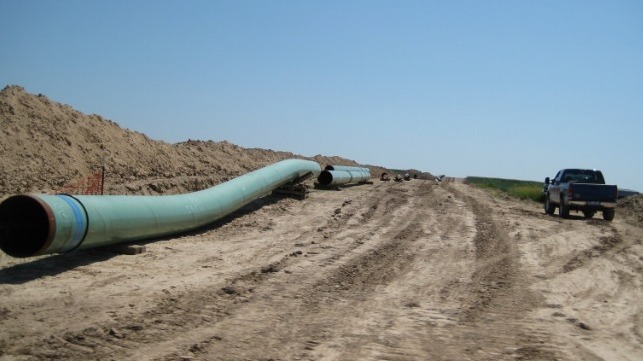Supreme Court Ruling Creates New Delays for Keystone XL

Canada's long-delayed Keystone XL export pipeline hit another delay Monday when the U.S. Supreme Court temporarily excluded it from a fast-track federal permitting program.
If completed, Keystone XL would connect Alberta's bitumen producers with overseas refiners via marine export terminals on the U.S. Gulf Coast. At present, Alberta's extra-heavy oil is effectively stranded by its geography; with access to the sea, it could be sold to any buyer, not just American and Canadian refiners. It is a high priority for Alberta's government, which is providing $1.1 billion in direct funding and $4.2 billion in loan guarantees to support the pipeline's construction. But to build it, developer TransCanada (rebranded last year as TC Energy) has to obtain permitting and approvals for construction of more than 1,100 miles of pipeline and 1,000 water crossings within U.S. territory.
In April, federal district court judge Brian M. Morris ruled that the Army Corps of Engineers acted improperly in issuing a nationwide permit for multiple pipeline projects that cross bodies of water, including Keystone XL. That ruling found that USACE's blanket permit for waterway crossings (National Permit 12) was not compliant with the requirements of the Endangered Species Act; the ruling required all covered projects to halt work until detailed environmental impact studies are completed for each.
In an order issued Monday, the Supreme Court put a stay on this district court decision pending appeal - except for Keystone XL. The USACE's blanket permit will remain in effect for about 70 smaller pipelines, but Keystone XL will need to pursue a more rigorous EIS process (or await the outcome of an appeal) in order to obtain permitting for crossings.
In the one-paragraph order, the justices did not provide a rationale for singling out Keystone XL for exclusion from the stay; however, the original complaint in the case centered on Keystone.
A coalition of environmental groups, tribes and local residents welcomed the decision.
“Farmers, ranchers, tribal communities, and the clean water they depend on are a bit safer today thanks to the high court allowing the justice system to proceed in due course,“ said Dena Hoff, a Montana farmer and member of the Northern Plains Resource Council. “The Keystone XL pipeline is a threat to our air, land, water, and climate. We are glad the Supreme Court has rejected this effort to ram through this dangerous Canadian tar sands project.”

that matters most
Get the latest maritime news delivered to your inbox daily.
The American Petroleum Institute (API) praised the Supreme Court's decision to issue a stay, but it said that Keystone XL should not have been left out. "This is a significant step toward restoring more certainty for energy companies, but declining to revive the permit for Keystone XL is short-sighted as the project has already been thoroughly reviewed for well over a decade. As this case moves forward, we will urge the US Court of Appeals for the Ninth Circuit to reinstate the permit for all pipeline projects, including Keystone XL," said API Chief Legal Officer and Senior Vice President Paul G. Afonso in a statement.
President Donald Trump has long expressed support for the project, and he expedited its progress by signing an executive order to authorize the cross-border segment of its construction last year. Presumptive Democratic presidential nominee Joe Biden has promised to revoke that order if elected, raising the possibility that Keystone XL could be further delayed.
